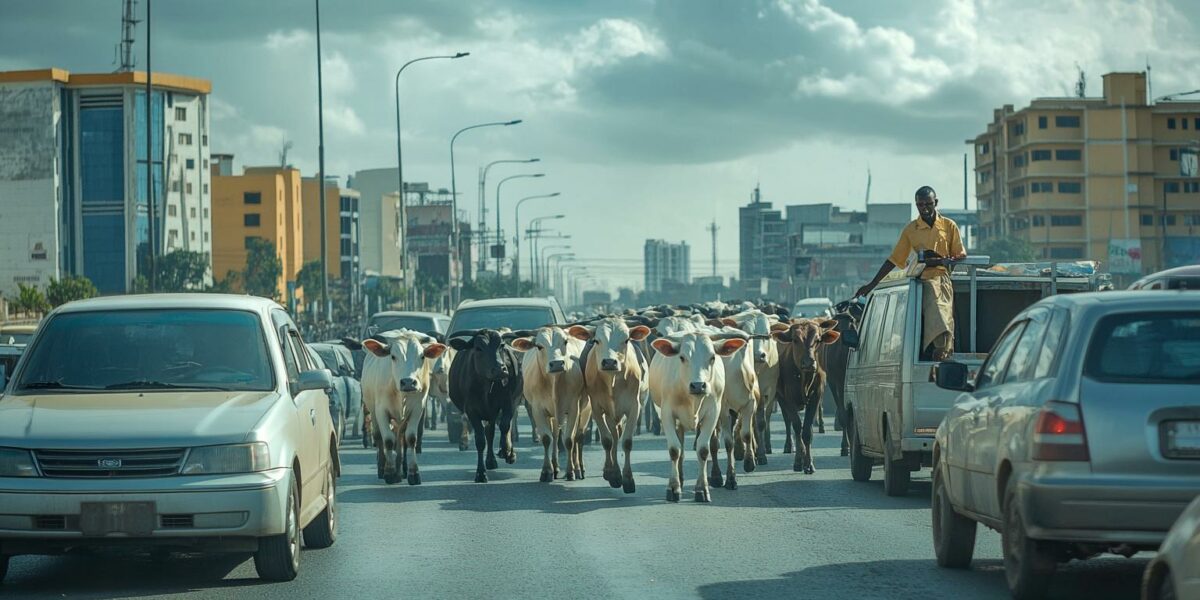Urban Chaos: Cows Invade Abuja
At a busy intersection in Abuja, frustrated drivers face an unexpected obstacle: a herd of cattle. The young herder, forced into the city by environmental changes, navigates the urban landscape with his livestock. This is a common sight, highlighting the challenges faced by herders in the Nigerian capital.
The herders’ migration is driven by the changing climate, which has turned their traditional grazing lands into deserts. As rural areas develop into housing estates and industrial complexes, herders are left with few options. Desperation forces them into city centers, where they clash with urban life.
The destruction of grazing lands for new developments has led to a significant shift for many herders. Settlements are destroyed, pushing families to the outskirts. Abubakar’s family now roams the main streets in search of pasture, reflecting a broader struggle for survival.
Despite suggestions for herders to acquire private land, financial constraints and lack of incentives make this unrealistic. The government’s promises of support remain unfulfilled, leaving herders in a precarious situation. This ongoing issue requires urgent attention and practical solutions.
The Inefficiencies of Nigeria’s Cattle Industry
Nigeria boasts over 20 million cows, yet the industry is plagued by inefficiencies. Fulani herders face obstacles in producing sufficient milk due to constant movement and inadequate diets. The city of Abuja experiences frequent traffic disruptions caused by cattle crossing busy roads.
The designated grazing reserves around Abuja lack necessary infrastructure and have been encroached upon. Herders are forced to set up temporary settlements, only to be displaced by legitimate landowners or government projects. This cycle of displacement hinders their ability to thrive.
Veteran herder Mohammed Abbas has faced repeated relocations. His current settlement is being overtaken by new developments, and he cannot afford permanent land. Other herders resist relocation, determined to stay despite pressures from landowners and authorities.
Mohammed’s family occupies a shrinking strip of land near Idu train station. They use this as a base while seeking pasture elsewhere. The lack of government action in resettling them reflects a broader neglect of pastoralists’ needs.
- Insufficient infrastructure at grazing reserves
- Encroachment by other farmers and illegal settlers
- Frequent displacement of herders
Development vs. Traditional Practices
Real estate development in Abuja has clashed with the needs of herders. Folawiyo Daniel, a real estate developer, blames poor urban planning for the ongoing conflict. He advocates for the revival of grazing reserves within the city to accommodate pastoralists.
Adebayo from the Housing Development Advocacy Network supports this view, urging the government to take decisive action. He believes that herders should be moved to designated areas or restricted to private properties. This would alleviate the issue of open grazing in urban areas.
The government’s response has been limited. Despite assurances of ongoing efforts, no concrete measures have been implemented. Herders express willingness to adapt to restricted herding practices if proper support and infrastructure are provided.
Ngelzarma, the cattle association chief, points to the government’s neglect of the livestock sector. Unlike other industries, herders receive no incentives or infrastructure support. Reviving grazing reserves with necessary facilities could transform the industry and reduce urban conflicts.
Balancing Modernization and Tradition
The issue of cattle herding in Abuja is a complex interplay of modernization and traditional practices. Environmental changes and urban development have pushed herders into the city, creating conflicts with urban residents and businesses.
As the city expands, the need for a sustainable solution becomes more pressing. The government’s role in providing infrastructure and incentives is crucial in resolving this issue. Effective urban planning must consider the needs of both herders and city dwellers.
The situation in Abuja is reflective of a broader challenge faced by pastoralists across Nigeria. Addressing this requires a multifaceted approach, involving stakeholders from various sectors. Collaboration and commitment are key to finding lasting solutions.
Ultimately, the future of Nigeria’s cattle industry depends on balancing modernization with traditional herding practices. By supporting herders and providing necessary resources, the government can help create a more sustainable and harmonious coexistence in urban areas.



SashaLabyrinth2
Climate change is affecting everyone differently. We need global action now!
Matthew9
Thanks for bringing this issue to light. More people need to be aware of what’s happening. 🙏
Michael
Are there any organizations working to support these herders?
smokeyphoenixfire3
This is such a complex issue. I hope the government steps up and provides real solutions soon.
Claire
Ugh, traffic is bad enough without cows in the middle of the road. Isn’t there a better way to handle this?
alexisdreamweaver0
It’s shocking to see how climate change is affecting different parts of the world. What can we do to help?
Genesis
This is why proper urban planning is so important. We need to think about everyone, not just developers!
AydenFlare6
Why can’t the herders just buy private land? Surely that’s a better solution?
TigerWisp
Wow, this is really sad. 😢 What is the government doing to help these herders?